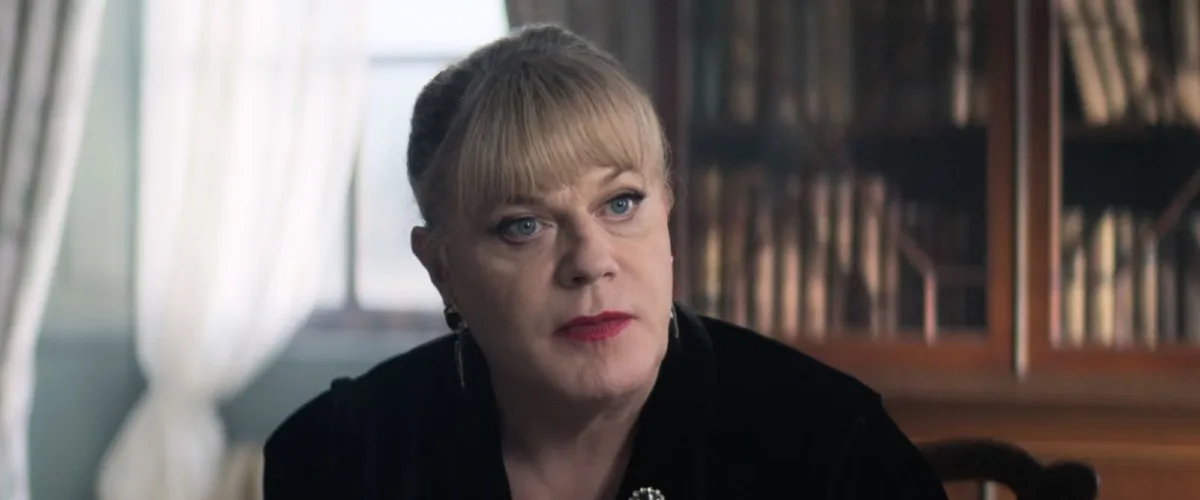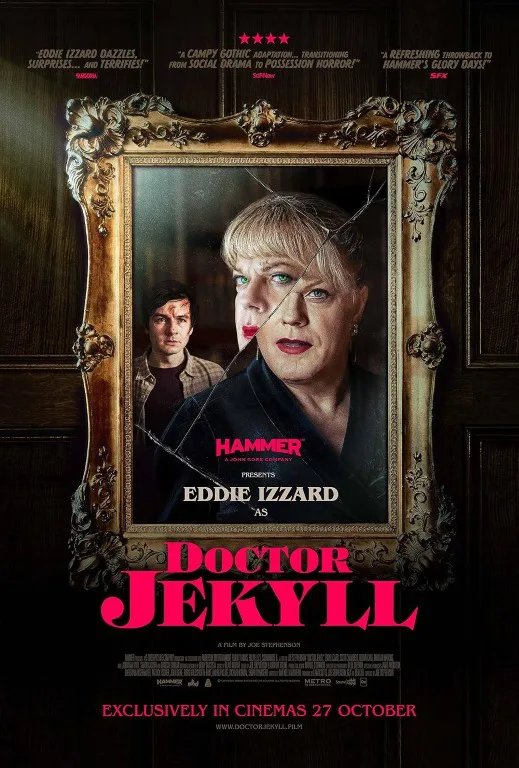The name Hammer used to command a certain level of respect in the annals of horror cinema – from the late 1950s to the early ’70s, you could pin the label to some of the campiest, schlockiest, most entertaining creature features around, from camp retellings of Universal monsters to sci-fi Quatermass mysteries. But the Hammer Films of this year’s “Doctor Jekyll” is hardly the same company William Hinds and James Carreras built; the opening titles proudly plaster “A John Gore Company” below its production logo. Indeed, for as much as “Doctor Jekyll” rides high on its compelling central performance (and the gender politics therein), the film that surrounds that star turn can’t quite hide (or Hyde?) its weightlessness.
This isn’t the first time Hammer has put a gender-swapped spin on the acclaimed Robert Louis Stevenson story – see 1971’s “Dr. Jekyll and Sister Hyde,” in which a serum transformed a male Henry Jekyll into a libidinous female alter ego. But “Chicken” director Joe Stephenson and screenwriter Dan Kelly-Mulhern have re-adapted the story into a low-fi chamber play whose campy delights take far too long to take murderous shape.
Its delights, apart from Blair Mowat’s delightfully outre, baroque score, fall mostly on Eddie Izzard, and her mesmerizingly controlled turn as Dr. Nina Jekyll. She’s a reclusive billionaire with a mysterious condition that requires her to take her meds on time (gee, I wonder what happens if she skips a dose?). With her stern handler Sandra (Lindsay Duncan) overwhelmed, she puts out a call for hired help, and who should answer but Rob Stevenson (“Winnie the Pooh: Blood and Honey 2″‘s Scott Chambers), a baby-faced bad dad fresh out of prison and rehab, trying to get his life together so he can see his daughter.
In its first act, “Doctor Jekyll” plays out like a perverse low-budget spin on “Phantom Thread” – the tortured genius puttering away in their empty home, the fresh-faced muse unwittingly wrapped up in their machinations, the taskmaster training a jaundiced eye at the both of them. But the film struggles to maintain any kind of suspense as to Jekyll’s true motivations for hiring Rob, and the secretive nature of her condition; subplots involving motion-sensor cameras, locked rooms, and Rob’s drug-addict ex-wife flail about aimlessly before colliding in a bloody mess near the film’s end.
To her credit, Izzard holds the lean script aloft with aplomb, and she’s a solid 80% of the reason to watch this. She’s always been a tremendous performer, but being given the chance to lean so hard into her transness in these more recent roles unfolds new layers of performance that are nothing short of mesmerizing. As Nina, she’s prim, quiet, and commanding; she tears into a bowl of “crunchy, nutty corn flakes” with all the fervor of a filet mignon. As Rachel Hyde, she sneers and purrs her way through each line with divine camp. It’s hardly Shakespeare – funny, since she just came off a one-woman production of “Hamlet” – but she has tremendous fun with the part.
It’s her co-stars that let her down, for the most part. Sure, Lindsey Duncan frowns with the best of them, offering a Lesley Manville-sized fly in the ointment. But Chambers is simply not up to the task of keeping up with any of his co-stars, mugging and pouting and stammering his way through his lines as if the producers just couldn’t get Freddie Highmore on the phone.
Of course, it’s impossible to ignore “Jekyll”‘s implications regarding gender and transness; the original story, after all, is about transformation, of finding the hidden self that lies within and setting it free. By casting a trans woman as Jekyll in the first place, Stephenson complicates that narrative in ways both intriguing and befuddling. After all, both Jekyll and Hyde in this version are women, the split becoming less about her gender and more about her morality. (A black-and-white flashback awkwardly ties Nina to the original Henry Jekyll, though it humorously establishes that the “drug” that keeps Hyde in place comes in a cigarette that glows green when you smoke it. Talk about a hybrid strain.) But as the film barrels towards twists both predictable and not, a final turn throws some deeper confusion into the allegory in ways I can’t spoil but would be eager to hear other trans viewers’ thoughts on.
At 90 minutes, one could hardly fault “Doctor Jekyll” for being languorous. But it’s often too patient for its own good, content to slow-roll its inevitable outcome without giving us much to chew on besides Izzard and some cornflakes. The chance to explore the Jekyll-and-Hyde story through the lens of a late-in-life trans woman is too enticing to botch, especially with a performer as layered as Izzard in the title role. But it teeters too precariously between camp and character study, and never quite lands successfully on either side. And its final minutes seem to imply that, no matter how you identify, the body you truly want to occupy might not really belong to you. That’s a troubling implication to unpack.




















